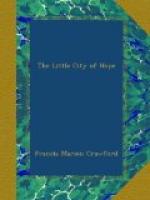He wistfully eyed a little coil of some very fine steel wire which would make a beautiful telegraph. Newton even dreamt of making the trolley, too, in the Main Street, but that would be a very troublesome job; and as for the railway station, it was easy enough to build a shed and a platform, but what is a railway station without a train?
Overholt did not answer the boy at once, and when he spoke there was a queer little quaver in his voice.
“We’ll call it our little City of Hope,” he said, “and perhaps we can ‘go to work to play,’ as you call it, so hard that Hope will really come and live in the City.”
“Well,” said Newton, “I never thought you’d ever care to see it! Shall I go up and get my stuff, and the gum and the flour paste, and bring them down here, father? But the flour paste smells pretty bad—it might give you a headache.”
“Bring it down, my boy. My headaches don’t come from such things.”
“Don’t they? It’s true that stuff you use here’s about as bad as anything, till you get used to it. What is it, anyway?”
Overholt gave him the almost unpronounceable name of some recently discovered substance, and smiled at his expression as he listened.
“If that’s its name,” said the boy gravely, “it sounds like the way it smells. I wonder what a skunk’s name is in science. But the flour paste’s pretty bad too. You’ll see!”
He went off, and his father finished cutting the little screw while he was gone, and then turned to look at the model again, and became absorbed in tracing the well-known streets and trying to recall the shops and houses in each, and the places where his friends had lived, and no doubt lived still, for college towns do not change as fast as others. He was amazed at the memory the boy had shown for details; if the lad had not yet developed any special talent, he had at least proved that he possessed one of those natural gifts which are sometimes alone enough to make success. The born builder’s eye is like an ear for music, a facility for languages, or the power of drawing from nature; all the application in the world will not do in years what any one of these does instantly, spontaneously, instinctively, without the smallest effort. You cannot make talent out of a combination of taste and industry. You cannot train a cart-horse to trot a mile in a little over a minute.
Newton returned, bringing his materials, to describe which would be profitless, if it were possible. He had everything littered together in two battered deal candle-boxes, including the broken soup-plate containing the flour paste, a loathely, mouldering little mess that diffused a nauseous odour, distinctly perceptible through that of the unpronounceable chemical on which the Air-Motor was to depend for its existence.
The light outside was failing in the murky November air, and Overholt lit the big reflecting lamp that hung over the work-table. There was another above the lathe, for no gas or electricity was to be had so far from the town, and one of old Barbara’s standing causes of complaint against Overholt was his reckless use of kerosene—she thought it would be better if he had more fat turkeys and rump-steaks and less light.




